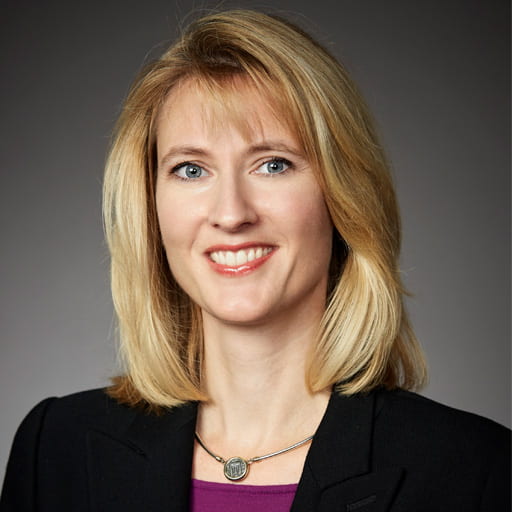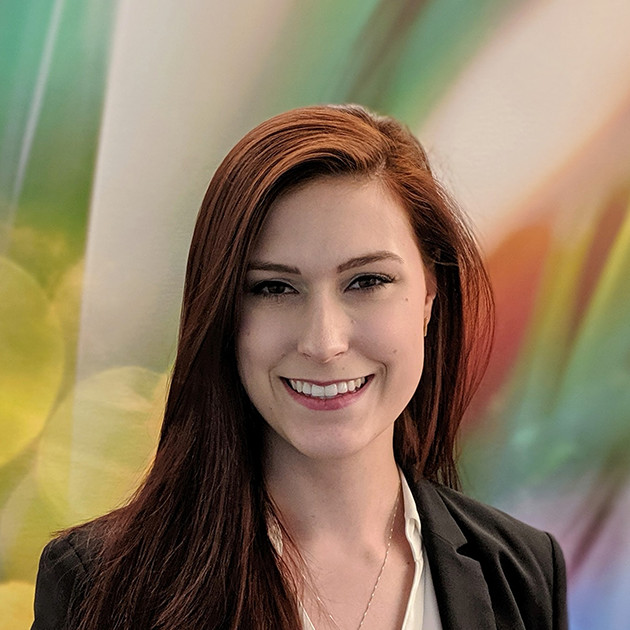
Stephanie Rigg, MBA’16, is a procurement specialist at Texas Instruments. The mother of three joins host Dr. Monica Powell, senior associate dean and dean of graduate programs at the Naveen Jindal School of Management, to discuss how her immersion in the Full-Time MBA program helped equip her for a safe transition from domestic engineer back into the workforce after a 15-year absence.
Transcript
Introductory music plays up through Monica’s introduction.
[Jimmie] This is yet another MBA G.O.A.T. A podcast featuring conversations with the greatest of all-time MBA alumni from the Naveen Jindal School of Management at the University of Texas at Dallas. We are here to celebrate the outcomes of graduate management education and to identify remarkable examples of how the MBA program here at the Jindal School has transformed the lives of our alumni. Now, here’s Dr. Monica Powell, Senior Associate Dean and Graduate Dean at the Jindal School. Take it away, Monica.
[Monica] Well, hello there; I am Monica Powell. I am the Senior Associate Dean and Graduate Dean here at the Jindal School of Management at the University of Texas at Dallas. (The music has continued through this, diminishes and ends.) The podcast is thrilled to have one of our former fulltime MBA’s, one of our alums, come back and spend some time in the chair. So, thank you, Stephanie Rigg, for coming to be with us this afternoon.
[Stephanie] Thank you so much for inviting me. It is a great honor.
[Monica] You know um, I was reflecting back ah to the time when you were coming into the program and we were going through all of the applications and we were having the big admissions meeting and making all of those important life decisions that affect um students and now alums. I remember the committee considering you and looking at you, thinking “This person is going to be amazing in the program. She has this undergraduate degree from Yale University. How could we possibly go wrong? But, man is she going to be this amazing marketing student when she gets out of here?” And now, all these years later, you aren’t in marketing, you are in really a procurement/supply chain role for Texas Instruments, one of the founding companies that founded UT-Dallas. So, how does somebody with a Yale University Bachelor of Arts in ethics, politics and economics end up in a great supply chain role for Texas Instruments?
[Stephanie] So, what the MBA did for me was give me a chance to figure out what kinds of work are available and where my interests and my skill sets would apply to those things. So, it started very literally with the catalog, and I started crossing off things that sounded horrible. So, (Monica laughing) things that I knew I couldn’t possibly do that they sounded too boring or too high risk. Um, and, so, when I looked at my list of what was left over, I was left with supply chain.
[Monica] That is a very interesting process and one that I might recommend to other students in the future.
[Stephanie] I knew I didn’t know what I wanted to do, so at that point eliminating things that looked unappealing was the only way I could figure out how to make progress ‘cause you have to start somewhere. You have to pick some classes.
[Monica] Right, you know my, my recollection of you being a student here and you were in the fulltime MBA daytime program. You did everything at a 10, 11 or 12 on a scale of one to five. So, your approach to everything is not to compromise on anything. And, and I think your classmates really saw you as somebody that was — I don’t know — a bit of an over achiever. So, so how have you managed that in your success at TI? I mean, you, you really got ah everything out of the program you possibly could.
[Stephanie] I came in ready to take everything the program had to offer me, and I have continued along that path. Um, TI is a place where initiative is rewarded and um, I’ve been able to look at things and say, “That looks interesting. Yup, I can do that.” My challenge actually is learning now to say no, um how and when to say no gracefully and appropriately without burning those really important networking bridges, um because I can’t actually do everything. I try really hard, but …
[Monica] I think you have demonstrated that as a student. I have no doubt you have demonstrated that at TI as well. You know, Stephanie, we market the MBA program to lots of different types of prospective students: ah, people that are looking to change the trajectory of their career, people who have made a career in marketing that suddenly want to be in finance, individuals who, ah, have been running their own business and want to go get the corporate experience or have been in corporate experience and want to go run a business. And, and, one of the aspects that MBA programs have not been completely successful with is recruiting women. It, this year, this fall is the first time that we have actually recruited nearly 50% women in the fulltime MBA program where the national average has been around 30 to 35%. And we also live in a time where you know there, there, are a lot of young individuals who you know want to step out of the working world to raise a family and then they have to figure out how to leverage their way back in. So, you were in a program as a female where it’s predominantly male, now it’s not, but when you were in the program, it was still 65% guys in the program,
[Stephanie] Right
[Monica] And, you were also a, a mom of, of several children
[Stephanie] Three kids, yah
[Monica] Three kids and you were also trying to transition what you knew to what you didn’t know, but you were going to find and go be. So how would you make the argument to other individuals who are out there like you who either stepped out of the workforce in your particular case you really didn’t step out of the work force, you were kind of trying to keep a leg in each, each world, but, but how do you make that argument to especially young millennials who may think that you know doing a fulltime MBA program is too big a sacrifice to find their way back into the work world.
[Stephanie] So for me, I had been out of the workforce 15 years.
[Monica] That’s a long time.
[Stephanie] Really long time, Um, so for me this was Adult Life 2.0. It was a complete system reboot. And, school was a way for me to reenter the workforce kind of safely. There is a path. Right, there is a Career Services Center. There are networking events on campus. As a graduate, I was a logical applicant to a job. And, even if I was a little bit of an odd duck, as an older, an older new college graduate, I didn’t quite fit the boxes. But, it was still enough of a logical context, that it, it helped me tell the story of why I was applying for a job now. I had been home so long it was challenging to come up with what have I done with and what skills do I have at this point.
[Monica] You, you did a lot of volunteer work when you were staying at home as well.
[Stephanie] I did. I, you know, I have three kids. I was very busy raising my three kids. When I was in the program, they were in the 9th grade, 7th grade and 3rd grade.
[Monica] So, attention, you can manage the fulltime program with kids at a broad age range and be incredibly successful.
[Stephanie] Yup, I dropped kids off at school every morning, I came to class. I picked kids up in car pool every day. We all did homework every night. Um, occasionally, I had to kick them off the Internet because I didn’t have enough bandwidth to upload my presentation and so my son had to get off his video game. I said, “Stop, I have homework to upload.” Um, and they had to pause what they were doing, so that I could submit my work. So, we did. We juggled it all, and the kids saw what I was doing and it was a transition for them. It was a transition for me. It is a place where I reconnected with my strengths. I haven’t been sitting around eating bonbons for 15 years. (Monica laughs softly.) I had been essentially running a small company with employees, staff, like my teammates were not the most cooperative at all times. Right? Any parent in the world knows that. And so, understanding how to re-frame my experience in language that the corporate world would understand and respect was part of what I gained through the MBA experience.
[Monica] You know, I think that’s the biggest fear that individuals have who step out of the workforce are like you did, you know. “Am I going to be convincing? Can I make a good case? Am I going to be a contributor? Can I make what I’ve been doing for X number of rears relevant in the work force?” And, I think that that’s, you know, what an amazing, what an amazing gift to get out of the program. Now, you worked really hard to obtain that gift. But, you know, that is an amazing take-away. Now that, now that you are, I mean, you’ve been out of the program now how many months? Years?
[Stephanie] Two and a half years
[Monica] So, two and a half years, so little bit more than 24 months
[Stephanie] umm hm
[Monica] and you’ve now been at TI
[Stephanie] Yah
[Monica] For that period of time. How has that adjustment of taking what you’ve learned in the MBA program, and I mean it was a great safe place to practice building your skills, gaining confidence, adding tools to your technology belt, to your intellectual belt, all of those things. But, now that you’ve made the transition, how can you look back and say, “Wow, that’s my success in TI is directly correlated back to X in the MBA program?”
[Stephanie] There’s always benefit in gaining confidence about trying new things. Um, the MBA was a chance to try a whole lot of new things. That accounting class, (she spoke with a smile in her voice), um in which I asked probably the dumbest question on record.
[Monica] Are you willing to share that question with the audience?
[Stephanie] Yes, because anyone can listen to this and say, “Holy cow, she didn’t.” Like, oh, yah, I did. Actually, I did. I was in an intermediate accounting class because I was trying to stretch myself in that area of the financial stuff, the accounting stuff. They were hard for me, but I wanted to focus on those in the academic environment because having an MBA, somebody might assume that I know how to do that stuff in the work place. I wanted a chance to experience it first in the academic setting. So, I was sitting there staring, but, I, I like you said, my undergraduate is liberal arts.
[Monica] Right
[Stephanie] This sample platter of liberal arts, never had seen an accounting class before the MBA and sitting there, looking at this slide and numbers are very neatly arranged in two columns which clearly have significance, but there’s no title at the top of the column because it is so obvious to the professor and apparently every other human sitting in the room. And, I actually raised my hand and said “Excuse me, those are um, those are obvious to you, but they aren’t to me. So which titles are supposed to go at the tops of those columns? And one of my cohort classmates was sitting next to me. And he just put his head his hands and shook his head like, “Oh no.” The answer was debit and credit.
[Monica] (Laughing) Well, it, it goes to show and, and since I sat on the admissions committee, and I know that you blew the top out of the GRE, um, the analytical skills were there. It goes to show that the brightest of people can learn from the simplest of presentation materials.
[Stephanie] And, you never learn if you don’t ask.
[Monica] That’s right.
[Stephanie] You know and granted that professor was a little concerned about my qualifications. He actually came over to me and said, “Are you sure you should be in this class?” (Monica laughed) He was really concerned. I, I spent a little time in his office after class explaining why I had no clue what debits and credits were, but it was still going to really be ok and…
[Monica] You are going to put in the time and the effort to do it. You know when you were a student you were also really actively engaged outside of the program, which I don’t know if you actually slept given that you were you know (slightly laughing) home engineer, you know, running a business at home and, and also in the program at the same time. So, how did you find time and what did you take away from being involved in an extracurricular way.
[Stephanie] So, I learned my limits. After 40, I was useless after midnight. So, that was very important to be efficient and prioritize the work. So, life doesn’t stop just cause you’ve taken on a new challenge, being open to whatever new experience showed up and going at it with a positive attitude, you know, open minded, positive, (music begins) I don’t know what is going to happen, but I’m going to assume it’s probably going to be good … helps um manage the anxiety of dealing with all of those new things and you just gotta put one foot in front of another.
[Monica] And just know you are going to survive the journey which is great.
[Jimmie] This episode is brought to you by the UT-Dallas MBA program, top-ranked nationally and in Texas. The UT-Dallas MBA combines a robust core with 13 concentrations. You have an option to add a second Master’s degree and your choices for that include five STEM designated programs. The MBA program has fulltime, part-time, online and other formats. They give you flexibility to fit your MBA education into your busy schedule. The skills and training you will receive are what top employers are looking for. For more information, visit us online at jindal.utdallas.edu/mba
[Monica] At Texas Instruments, you are the silicon procurement worldwide procurement and logistics manager, leader (question sound in her voice) (Music has diminished.)
[Stephanie] Right, so my role is on the silicon procurement team. Um,
[Monica] OK
[Stephanie] Silicon is one of the basic raw materials going into the semiconductor manufacturing process. So, we have a three-person team: a manager and two specialists. And I am the specialist in charge of all the commercial aspects of silicon procurement, um globally.
[Monica] So, you are a silicon specialist.
[Stephanie] Working on it — day by day. I rotated into this role April first, and so it is a great learning curve. Um, but, in fact, I just got back from a trip to visit one of our suppliers um in Japan and I have learned a lot in the last five months.
[Monica] That, that must be really exciting to just venture into this whole new world of exploration and understanding about all kinds of things that you just don’t have any prior knowledge about.
[Stephanie] You know it is fantastic to work with engineers because they love what they do and anyone who shows a genuine interest and willingness to learn, they are so delighted to explain and they will always draw me a picture, and it’s even better if I ask them, “Can you show me that?” um whether it is some kind of air sampling equipment or the way a wafer is constructed, the way a silicon wafer is constructed in the molecular lever. Um they are thrilled to explain.
[Monica] (laughing) Everyone finds their joy in their own way, right?
[Stephanie] That’s right, And my value out of the non-engineer in a very heavy engineering company is that if they can slow down and explain things well enough for me to understand then, I can write the contracts, I can circulate the meeting notes to the finance team and the warehouse team in a way that retains the substance of the information, get, I have to get all the essential information and be able to communicate it on to somebody else who is not in that same specialty. And, that’s a massive value in any setting, because we have to share information to be successful.
[Monica] And, you know that’s really interesting because one of the things we tell prospective MBAs all the time is that if you are really going to be successful long term, you really have to understand how to use all of the tools on the MBA belt and given that you are working in partnership with, with you know TI employees in all these other you know functional areas, it’s important that you communicate it in a way that they understand and since you understand finance, you can communicate it to the finance people. Since you under supply chain, you can communicate it to the supply chain, the marketing and all of those individuals. I imagine that getting the MBA, you get affirmation all of the time that, woe, that was worth it.
[Stephanie] It’s very much worth it to have a little taste of the vocabulary used in each of the different fields. And, honestly, in, in the peer group in which I work, the MBA is almost the price of admission. MBA’s are very, very common um among the people I work with because that level of integrated analytical thinking is really essential to all the work that we do.
[Monica] I think um I think the world of work is getting far more complex and integrated. And, I think that means that the MBA is going to become even more valuable in the future. Because as businesses optimize, use robotics, ah simplify, use analytics to streamline the decision making process, they are going to need more individuals who can think in an integrated capacity. And, it seems like TI is already there. They have always been at the forefront.
[Stephanie] We have a very versatile group. So, world-wide procurement and logistics coordinates all those functions, supply chain, and, and we have a very comprehensive approach to each commodity. So in my role as a buyer, I can touch contracts and SAP and the financial reporting. I need to be able to do all of those things to be able to manage my suppliers and meet the needs of my internal customers.
[Monica] Wow, that really sounds fascinating. I don’t know how terribly excited I could get too excited about silicon. But, hey, that sounds that sounds (softly laughing) like it’s a, it’s a great and thriving field. So, um, I want to take you back to you know, the time before you actually came into the program where you had been accepted, you knew that you were about to make this journey. I have the assumption that you had some expectations about what this was going to be like. So, I would like to know where we surprised you. Where were your expectations met? Where were your expectations exceeded? And, then, I would like to know from kind of the alum perspective looking back how could we have managed expectations differently in any capacity?
[Stephanie] Coming into the program, I knew I was terrified and had no clue what I was going to do next, but I didn’t realize that everybody else was, too. The Cohort MBA is designed for people making major transitions and as a pivot point in all of our lives … We were all pivoting in different directions right, from, to, that was all different, but everybody had taken a massive leap of faith. And, the comradery that that generates, that surprised me. I knew it was going to be great to be with the Cohort. That is one of the reasons I chose a face to face program, the Cohort program, because I wanted that support as I transitioned back into the work force. And so, I was expecting to learn a lot from my colleagues, my classmates and I did. They certainly exceeded my expectations though and the wealth of experience they brought to the table um and everyone’s willingness to, to share and cooperate.
[Monica] So, in thinking about you know the MBA, now that you’re you know 24-plus months out, you know, looking back on the experience, would you have done anything differently?
[Stephanie] I don’t think so. I took advantage of every opportunity I could fit into my schedule. I think I did a good job listening to the advice of the Career Services people and the MBA Program Office who said, “Remember, focus on the networking. Focus on the job application process. The goal, the end-goal is fulltime employment.” Um, and so, as someone who has always taken pride in academics and my school work, it was, I needed that reminder to um remember that the point is the job, and yes, the academics are fundamental, you can’t get A without B, but learning to strike that balance was really essential to my success.
[Monica] So, I imagine given that, that, you did have a few extra balls in the air that you were juggling that the majority of the fulltime students don’t, who don’t have a multitude of kids and you know someone who had been home for 15 years. I would imagine that results in you having to optimize in ways that you didn’t quite know you were capable of or needed to do at the time. But, taking that optimization into your job at TI, I imagine you are gaining some incredible efficiencies (slight laugh) from having kind of gone through the intensity of this experience and then, you know applying it in the corporate context.
[Stephanie] In today’s world, no company has extra headcount. Everyone’s plate is really full. And so, having worked through what to do with an overflowing plate during the MBA program, I was very well prepared to take stock of my scope of work and prioritize and leverage resources around me um, just like I did in class, then prepping for a job interview, I had 20 minutes, I think in between classes the day before an interview, but, I knew which of my classmates had experience working in a warehouse somewhere, I said, “OK, I need help” and so I sat with a couple of the guys and they walked me through how to approach a particular type of supply challenge to help me prep a case for my interview the next day. I couldn’t have done that for myself in 20 minutes, but I knew who to reach out, and that’s half of anybody’s success.
[Monica] Exactly, and you need those types of relationships inside TI to continue that proposition going forward which is really exciting. If you were going to give some advice, let’s just say three pieces of top notch advice, to a stay-at-home mom who has been out there for 10 plus years, what advice would you give them about taking the leap of faith to come back and invest in themselves because getting an MBA, is about investing in yourself, it’s a worthwhile selfish decision that can end up positively effecting everybody, your family, your future, everything. But, what would you say? What would that advice be?
[Stephanie] First remember that you are really classified as value talent. Right, you have all this experience and all these abilities, But, you will be coming in, in probably in a lower position in the corporate hierarchy. You have so much to offer , ,and I think as a stay-at-home mom, it is easy to forget the skills that you take for granted in juggling, getting everybody where they are supposed to be on time with the stuff they need while they keep distracting you every 2 seconds. That’s not easy to do, um
[Monica] Did you articulate that in, in an interview and stress to somebody that was considering hiring you that that is an incredible value added opportunity for them?
[Stephanie] I actually had a conversation at one of the MBA conferences I, I went to with a guy about my age also you know with kids in similar age ranges and we were talking about my journey back. Um, he, he was a professional attending the conference and recruiting for a position, and he said, “Oh, I know what my wife does with our kids. I know exactly what you are capable of. I would hire you in a minute.”
[Monica] That’s awesome!
[Stephanie] So, I think people who have experienced it understand the challenges of managing a household. When you are talking to the twenty-something interviewer, it’s a little bit challenging to articulate that in a way that they understand, but it can be done.
[Monica] Experience is everything. If you’ve had the experience, then, they are going to get it.
[Stephanie] That’s right. And if, if you’re, when I was talking to a twenty-something, single interviewer, that is one of examples that I used because they wouldn’t make sense.
[Monica] Yah, you just have to be smart, understand the audience and pick the answer. So, that was advice #1, What is number 2 and number 3?
[Stephanie] Be brave and be optimistic. Good things are around the corner, but not if you don’t reach for them. And, think about your children. Think, we as a stay-at-home mom, we invest 24/7 for however many years in building a future for your children in thinking of them as grown adults and what do you want for them? What kind of attitude do you want them to have as they enter the work force? What kind of examples do you want for your daughter, for your son? And, that can make it less scary, make it feel less selfish. Because I want my daughter to know that she can be professional. She can follow her dream. She can do whatever she sets her mind to even if it’s hard. And, I want my sons to respect women in the workforce. How are they going to do that if they’ve never seen Mom work?
[Monica] I think that is exceptional. I had a similar experience. I stepped out of the workforce to get a Ph.D. and I had a second grader, a ninth grader and an eleventh grader when I did that for four years fulltime and, and I think that now and I mean we’re talking about decades later, I look at the impact that that has on my own children and the success of their career, the discipline, the importance of them seeing a parent make a sacrifice of importance, of them seeing you study, the importance of them seeing you fail, the importance of them seeing you take risks. So, it sounds like you’ve a really similar experience ant that you’ve been able to give that gift to your kids and that’s going to pay dividends the rest of their life.
[Stephanie] I hope so. The older two are just launching now and the little one is still in sixth grade, so we’ve got a little, little time before that return on investment.
[Monica] Yah, I, it will come. Ah, mark my words having lived that journey. If, if you were going to put into a single sentence, I guess as we wrap up what your chief take-away from the investment that you made here was?
[Stephanie] Success in life is all about people. Skills are essential. You can always learn something new. You can learn accounting. You can learn finance. You can learn strategy, but fundamentally your success is determined by your ability to connect with people, to build relationships (music begins), to understand what’s important to people and to communicate effectively.
[Monica] Couldn’t have said it better than that. Stephanie, thank you so much for being with us on our podcast. I think there’s a lot of folks out there that are really going to be inspired by what you have done who want to take that leap of faith and will have similar success, so thank you for being here.
[Stephanie] Thanks so much for inviting me.
[Monica] Thank you so much for listening to today’s podcast I hope that you were inspired by the words you heard from one of our Greatest Of all Times MBA G.O.A.T.s . If you were inspired to think about getting an MBA degree, I hope that you will be in touch with us. Give us a call, drop us an e-mail, hop on our website. Be in touch with us so that we can help you make a difference in your future. We look forward to hearing from you.
[Jimmie] Thanks for listening to this episode of yet another MBA G.O.A.T. podcast. Join us online at mbagoat.com to find episode notes, links and more. Be sure to subscribe to yet another MBA G.O.A.T. podcast on Apple podcast or your favorite podcasting app. If you like what you hear, please leave us a five-star review. That will help spread the word about the podcast and Jindal School’s MBA programs. To learn more about the Jindal School’s MBA program, go to jindal.utdallas.edu/mba. (Music continues.)





